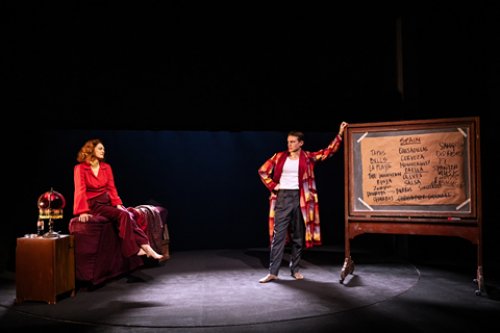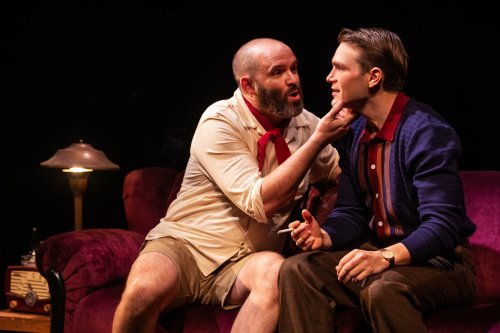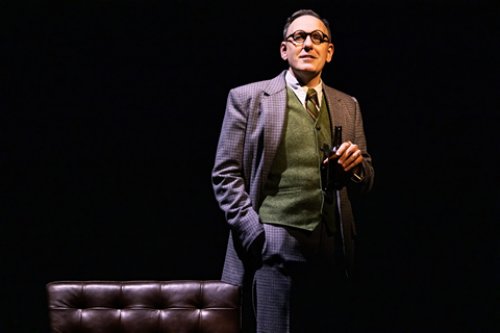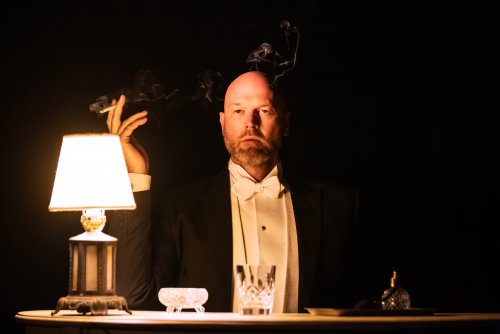Spain
A satiric play about the creation of the propaganda film "The Spanish Earth" written by Ernest Hemingway and John Dos Passos which plays fast and loose with the known facts.

Marin Ireland as Helen and Andrew Burnap as Joris Ivens in a scene from Jen Silverman’s “Spain” at Second Stage’s Tony Kiser Theater (Photo credit: Matthew Murphy)
[avatar user=”Victor Gluck” size=”96″ align=”left”] Victor Gluck, Editor-in-Chief[/avatar]
Until now it has been believed that the 1937 Joris Ivens-Ernest Hemingway documentary The Spanish Earth was paid for by a corporation called Contemporary Historians sponsored by some of the most famous liberal writers of the time: playwright Lillian Hellman, mystery writer Dashiell Hammett, poet, screenwriter and essayist Dorothy Parker and her husband Alan Campbell, poet Archibald MacLeish, novelists John Dos Passos and Hemingway. However, in Spain, contemporary playwright Jen Silverman has another idea: what if this famously propaganda film was financed by the KGB and that filmmaker Ivens and his girlfriend/editor Helen van Dongen were agents for KGB operatives in New York?
Using this theory, Silverman has written Spain as a sort of satiric/comic/dramatic view of the events surrounding this legendary project. Her message seems to be that all art is propaganda, a debatable but interesting theory. Most of the play takes place during the fall of 1936 in a West Village apartment lived in by Dutch filmmaker Ivens and his girlfriend Helen. The historical Ivens was an experimental filmmaker who did travel to Moscow in 1929 and make a documentary that was financed by the Russians. If he and Helen became KGB operatives, that calls for additionally needed research. It is known that there were Russian operatives in service of the Communists in Spain working on the side of the Republican front.

Danny Wolohan as Ernest Hemingway and Andrew Burnap as Joris Ivens in a scene from Jen Silverman’s “Spain” at Second Stage’s Tony Kiser Theater (Photo credit: Matthew Murphy)
In the play, Ivens and Helen who have never been to Spain are asked by their Russian handlers to create a documentary that will make Americans interested in the Republican cause fighting in the Spanish Civil War. Not knowing anything about Spain, they brainstorm things that they associate with the country in a comic scene which makes them look rather silly. It is also suggested that they get American novelist John Dos Passos and Ernest Hemingway, both proponents of the Republican cause to write the screenplay.
In additional satiric scenes, both Dos Passos and Hemingway are invited to visit Ivens and Helen, Dos Passos seemingly interested in Helen. However, the rivalry between the two men makes things difficult and then their handlers decide that Dos Passos has to be fired from the project. (In fact, he wrote the first part of the film and Hemingway the second.) Hemingway is seen recording part of his narration for the film. (In point of fact, there are two existing versions, one narrated by Hemingway and one by Orson Welles which is the one previewed at the White House by President Roosevelt and the First Lady.) After a single satiric scene set in Spain, the play jumps to the present and in a fantasy scene has all the same characters working on a propaganda project using the latest technology today.

Erik Lochtefeld as John Dos Passos in a scene from Jen Silverman’s “Spain” at Second Stage’s Tony Kiser Theater (Photo credit: Matthew Murphy)
While the satire is mild and the comedy slight, the play under the smooth direction of Tyne Rafaeli is entertaining if only to see some accomplished actors do their stuff with some juicy and quirky characters. Marin Ireland is best as Helen in a three dimensional portrait that works on many levels. She also adds an air of mystery as she reveals various things in Helen’s past little by little. As filmmaker Joris Ivens (without a Dutch accent), rising actor Andrew Burnap (Tony Award for Best Actor in The Inheritance and King Arthur in last season’s Camelot at Lincoln Center) is rather too naïve to believe. While Erik Lochtefeld gives a full-bodied performance as Dos Passos making you curious to go back and read his novels, Danny Wolohan’s Hemingway always seen dressed in khaki shorts is a hearty oaf, more satiric than authentic. The nearly silent Zachary James (who gets to sing an impressive operatic aria) is extremely elegant as two KGB operatives – unless it is meant to be the same man in two disguises.
Dane Laffrey’s sets which use a revolving stage for quick changes is at times atmospheric, at others not so much. The 1930’s costumes by Alejo Vietti immediately define the various characters and their points of view. However, Jen Schriever’s lighting is only partially successful in creating a film noir ambiance. Daniel Kluger’s sound design and original music beautifully and dramatically covers the scene changes.

Zachary James as Karl in a scene from Jen Silverman’s “Spain” at Second Stage’s Tony Kiser Theater (Photo credit: Matthew Murphy)
In writing a play about disinformation, Jen Silverman has unaccountably played fast and loose with the facts of the Joris Ivens/Ernest Hemingway film The Spanish Earth. While the play’s value is debatable, it does mark an advance for this playwright whose previous plays The Moors, The Roommate and Collective Rage: A Play in 5 Betties seems to get better and better with each new one. It also gives Marin Ireland as Helen a tour de force role that should not be missed.
Spain (through December 17, 2023)
Second Stage
Tony Kiser Theater, 305 W. 43rd Street, in Manhattan
For tickets, call 212-541-4516 or visit http://www.2st.com
Running time: 95 minutes without an intermission






Leave a comment